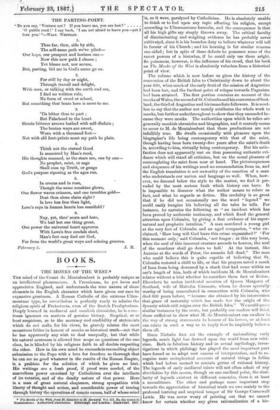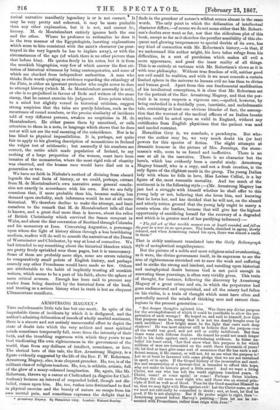BOOKS.
THE MONKS OF THE WEST.*
THE mind of the Count de Montalembert is probably unique as an intellectual phenomenon. A Frenchman, he yet loves and appreciates England, and understands the true nature of those elements in the English character which have given our race its expansive greatness. A Roman Catholic of the extreme Ultra- montane type, he nevertheless is perfectly ready to admire the religious spirit of Protestants, even of the Scotch Presbyterians. Deeply learned in medimval and monkish chronicles, he is some- times ignorant on matters of genuine history. Sceptical, or at least suspicious, as to the accuracy aud credibility of statements which do not make for his viewil, he gravely relates the most monstrous fables in honour of monks as historical truth—not that he has apparently any wish to deal unequally, but that while his natural acuteness is allowed free scope on _questions of the one class, he is blinded by his religions faith to all doubts respecting the other. How in his own mind he succeeds in reconciling abject submission to the Pope with a love for freedom so thorough that he can see no good whatever in the results of the Roman Empire, is a problem for the solution of which he gives no hint. His writings are a fresh proof, if proof were needed, of the marvellous power exercised by Catholicism over the intellects of its votaries, and of the deadly nature of that power. Here is a man of great natural eloquence, strong sympathies with liberty of thought and action, and considerable power of tracing through history the operations of remote causes, half of whose mind • The Monks of the West, from St. Benedict to 81. Bernard Vol. III. By the Count de Montelemtan I. 'Authorized translation. Edinburgh and London: Blackwood. 1867.
is, as it were, paralyzed by Catholicism. He is absolutely unable to think or to feel upon any topic affecting his religion, except according to Ultramontane formulte, and the consequence is that all his high gifts are simply thrown away. The critical faculty of discriminating and weighing evidence he has probably never cultivated, since it is his bounden duty to believe whatever will tell in favour of his Church ; and his learning is for similar reasons one-sided ; but in spite of these defects he possesses some of the
rarest powers of a historian, if he could only use them aright. So poisonous, however, is the influence of his creed, that his book on The Monks of the West is absolutely valueless from a historical point of view.
The volume which is now before us gives the history of the conversion of the British Isles to Christianity down to about the year 630, when much of the early fruit of the mission of Augustine bad been lost, and the furthest point of relapse towards Paganism had been attained. The first portion contains an account of the monks of Wales, the second of St. Columba and his conversion of Scot- land, the third of Augustine and his immediate followers. It is need- less to say that the author not merely attributes the whole work to monks, but further seeksthroughout to show that they succeeded be- cause they were monks. The authorities upon which he relies are generally monkish chronicles and biographies, and it scarcely seems to occur to M. de Montalembert that these productions are not infallibly true. He dwells occasionally with pleasure upon the biographer's life being contemporary with that of the saint, though having been born twenty-five years after the saint's death is, according to him, virtually being contemporary. But his satis- faction does not apparently rest on thus possessing authentic evi- dence which will stand all criticism, but on the moral pleasure of contemplating the saint from near at hand. The picturesqueness and eloquence of his writings need no commendation from us, and the English translation is not unworthy of the sanction of a man who understands our nation and language so well. When, how- ever, we descend below the style to the matter, we find it per- vaded by the most serious fault which history can have. It is impossible to discover what the author means to relate as fact, and what he regards as fiction. His credulity is so great that if he did not occasionally use the word " legend " we Could easily imagine his believing all the tales he tells. For Instance, he narrates the following as "an incident which has been proved by authentic testimony, and which fixed the general attention upon Columba, by giving a first evidence of his super- natural and prophetic intuition." A man murdered a young girl at the very feet of Columba and an aged companion, "who ex- claimed, 'How long will God leave this crime unpunished?' ' For this moment only,' said Columba, not longer ; at this very hour, when the soul of this innocent creature ascends to heaven, the soul of the murderer shall go down to hell.' At the instant, like Ananias at the words of Peter, the assassin fell dead." The man who could believe this is quite capable of believing that St. Columba restored a child to life, or that his prayers saved a monk of Iona from being devoured by a shark that had come within an oar's length of him, both of which incidents M. de Montalembert relates without a hint whether he considers them fact or fiction. Elsewhere he makes incidental mention of Queen Margaret of Scotland, wife of Malcolm Canmore, whom he deems specially worthy of being remembered in connection with Columba, who died 600 years before, "because she obtained by his intercession that grace of maternity which has made her the origin of the dynasty which still reigns over the British Isles:" We could quote similar instances by the score, but probably our readers will think these sufficient to show what M. de Montalembert can swallow in the way of strong statements in honour of his heroes, or at least can relate in such a way as to imply that he implicitly believes them all.
Since Niebuhr first set the example of rationalizing early legends, much light has dawned upon the world from new criti- cism. Both in fabulous history and in actual mythology, inves- tigations in which philology has played the most important part have forced us to adopt new catnips of interpretation, and to re- cognize mere metaphorical accounts of natural things in fables which bad before seemed to contain germs of rational history. The legends of early mediteval saints will not often admit of any elucidation by this means, though on one cardinal point, the simi- larity of legends existent in different countries, there is at least a resemblance. The other and perhaps more important step towards the appreciation of historical truth we owe mainly to the profound learning and sceptical temper of Sir George Cornewall Lewis. He was never weary of pointing out that we cannot know for certain whether any given rationalization of a his- torical narrative manifestly legendary is or is not correct. a' It may be very pretty and coherent, it may be more probable than any other explanation, but it is not, and cannot ,be, history. M. de Montalembert entirely ignores both the one and the other. Where he professes to rationalize he does it in the true manner of the Egyptologists, inserting explanations which seem to him consistent with the saint's character (as pour- trayed in the very legends he has to explain away), or with the circumstances of the age (of which there is no other picture than that before him). He quotes freely in his notes, but it is from the monkish biographies, very few of which answer the first cri- terion of historical witnesses by being contemporaries, and none of which are checked from independent authorities. A man who thinks Bede worth quoting as evidence regarding the ethnology of the Picts, is either an ignorant pretender who ought never to dare to attempt history (which M. de Montalembert assuredly is not), or else is so prejudiced in favour of Bede and writers of the same stamp, that he cannot exercise his judgment. Even points which, to a mind but slightly versed in historical criticism, suggest strong suspicion that the tales are purely fabulous, such as the recurrence of round numbers, or the precise similarity of incidents told of very different persons, awaken no scepticism in M. de Montalembert. He either passes them by unnoticed, or calls attention to them in a note, in language which shows that he does not or will not see the real meaning of the coincidence. Nor is he leas blind to physical impossibilities. It is, perhaps, not quite fair to apply to his glowing description of monasticism in Ireland the vulgar test of arithmetic ; but assuredly if his numbers are correct, the entire adult made population of Ireland, to say nothing of a large proportion of the women, must have been inmates of the monasteries, where the most rigid rule of chastity was observed, and the human race would have died out in a generation or two.
We have no faith in Niebuhr's method of divining from absurd legends the real facts of history, or we could, perhaps, extract from M. de Montalembert's own narrative some general conclu- sion not exactly in accordance with his own. But we are fully conscious that, if more probable than his, because making less demand upon credulity, such inferences would be not at all more historical. We therefore decline to make the attempt, and limit ourselves to the remark that M. de Montalembert tells all that is known, and a great deal more than is known, about the relics of British Christianity which survived the Saxon conquest in Wales, and about the first conversion of Scotland through Columba and his monastery at Iona. Concerning Augustine, a personage upon whom the light of history shines through a less bewildering medium, readers will do well to consult the narratives of the Deans of Westminster and Chichester, by way at least of corrective. We had intended to say something about the historical blunders which are pretty freely sprinkled over these pages, but it is unnecessary. Some of them are probably mere slips, some are errors relating to comparatively small points of English history, and perhaps scarcely any other Frenchman would have made so few. Others are attributable to the habit of implicitly trusting all monkish writers, which seems to be a part of his faith, above the sphere of mere critical acumen. Enough has been said to prevent any reader from being deceived by the historical form of the book, and treating as a serious history what in truth is but an eloquent Ultramontane manifesto.































 Previous page
Previous page